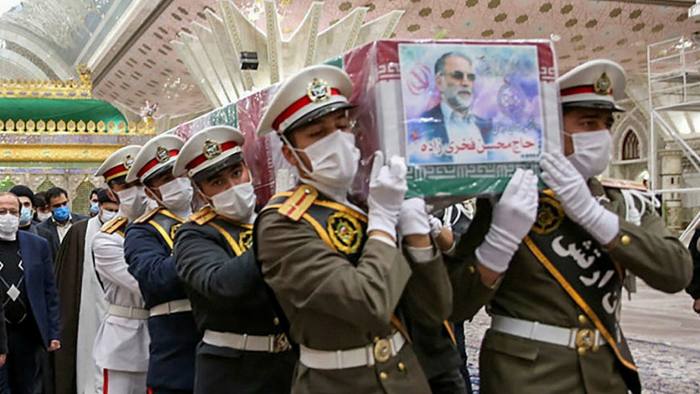Australia/Israel Review
Media Microscope: Death of a “scientist”
Dec 22, 2020 | Allon Lee

The assassination of Iran’s top nuclear scientist Mohsen Fakhrizadeh provoked a plethora of questions over what the operation was intended to achieve.
SBS reporter Ben Lewis’ informative report on SBS TV “World News” (Nov. 28) included Iran’s Defence Minister Amir Hatami praising Fakhrizadeh’s “big accomplishments in the field of defence”. Lewis reported that Iran claims its nuclear program is peaceful but Western intelligence agencies believe Fakhrizadeh was in charge of a “covert” weapons program. CNN correspondent Jomana Karadsheh told SBS newsreader Anton Enus the killing is extremely embarrassing for Iran, given he was one of the country’s best-guarded individuals.
The next day on SBS TV “World News”, reporter Catalina Flores talked of the threat to Israel from Iran, showing on a regional map that Iran “has forces at its disposal surrounding Israel, including troops and proxies in neighbouring Syria and Hezbollah in Lebanon.”
The Australian (Nov. 30) said, “Fakhrizadeh was working secretly at building Tehran’s nuclear weapons. That should convince Mr Biden of the need to keep the pressure on Tehran…Mr Biden must insist that unless Tehran comes clean about its nuclear program there will be no talks.”
Similarly, AIJAC’s Jamie Hyams in the Daily Telegraph (Dec. 3) wrote, “Fakhrizadeh…was also a Brigadier-General in the Islamic Revolutionary Guard Corps (IRGC). The IRGC is not only the main instrument of hard-line control and repression within Iran, but also organises and funds various proxy terror groups and militias across the Middle East, and even further afield. The IRGC also controls Iran’s nuclear weapons program, making Fakhrizadeh a senior officer in a terrorist military organisation leading an illegal nuclear weapons program.”
The News Corp papers (Nov. 30) quoted former Obama counter-terrorism adviser John Brennan’s condemnation of the killing as a “criminal act and highly reckless” which “risks lethal retaliation and a new round of regional conflict.” The Obama administration faced similar accusations for killing al-Qaeda chief Osama bin Laden in Pakistan, which Brennan coordinated.
The Guardian Australia (Nov. 30), denounced the killing, saying, “Trump evidently believes Netanyahu when he claims Iran is building a bomb, despite a lack of clear evidence. He has swallowed the simplistic right-wing narrative of Iran as evil, existential threat… If Iran retaliates for the assassination, it could plunge the Middle East into violent chaos and wreck Biden’s hopes of a new start.”
On the ABC podcast “The Signal” (Dec. 4), Iranian-American journalist Negar Mortazavi said the goal of the killing was to make diplomacy harder for Biden and to “provoke Iran into a violent or lethal retaliation… and then pull them into a wider conflict or provide a pretext for military engagement between Iran and the Trump Administration.”
On ABC Radio National “Breakfast” (Nov. 30), American academic and regime sympathiser Trita Parsi predicted Iran’s nuclear program would be “set… back [only] a couple of months… in the past… these assassinations have tended to take place… when a breakthrough in diplomacy was likely to happen.”
Later that day, on ABC Radio “World Today”, NY Times security correspondent David Sanger said, “it’s been interesting over the past four years, for all the people who thought that Donald Trump would be trigger happy. The one thing he’s been reluctant to do has been get the United States more deeply involved in conflicts in the Middle East.”
On “Breakfast” the next day, former US Ambassador to the UAE David Mack said he concurred with UAE Foreign Minister al-Nahyan’s description of the killing as “heinous”, and believed “people in Washington are finally getting the message that this kind of brass knuckles approach to relations with Iran… does not really work.”
Meanwhile, on ABC Radio National “Breakfast” (Dec. 12), Israeli journalist Barak Ravid said he doubted Netanyahu would order a “military strike against Iran… [he] had several chances in the last decade… The Israeli military was prepared to do it, and Netanyahu at the last minute decided not to. So I don’t think that there’s a real risk right now.”
Ravid also said Biden’s team is telling Netanyahu, “don’t fight us on going back to the first deal. Work with us on forming a new deal… that would be for another decade that will also deal with missiles, that would also deal with regional things.”
Tags: Australia, Iran, Media/ Academia






